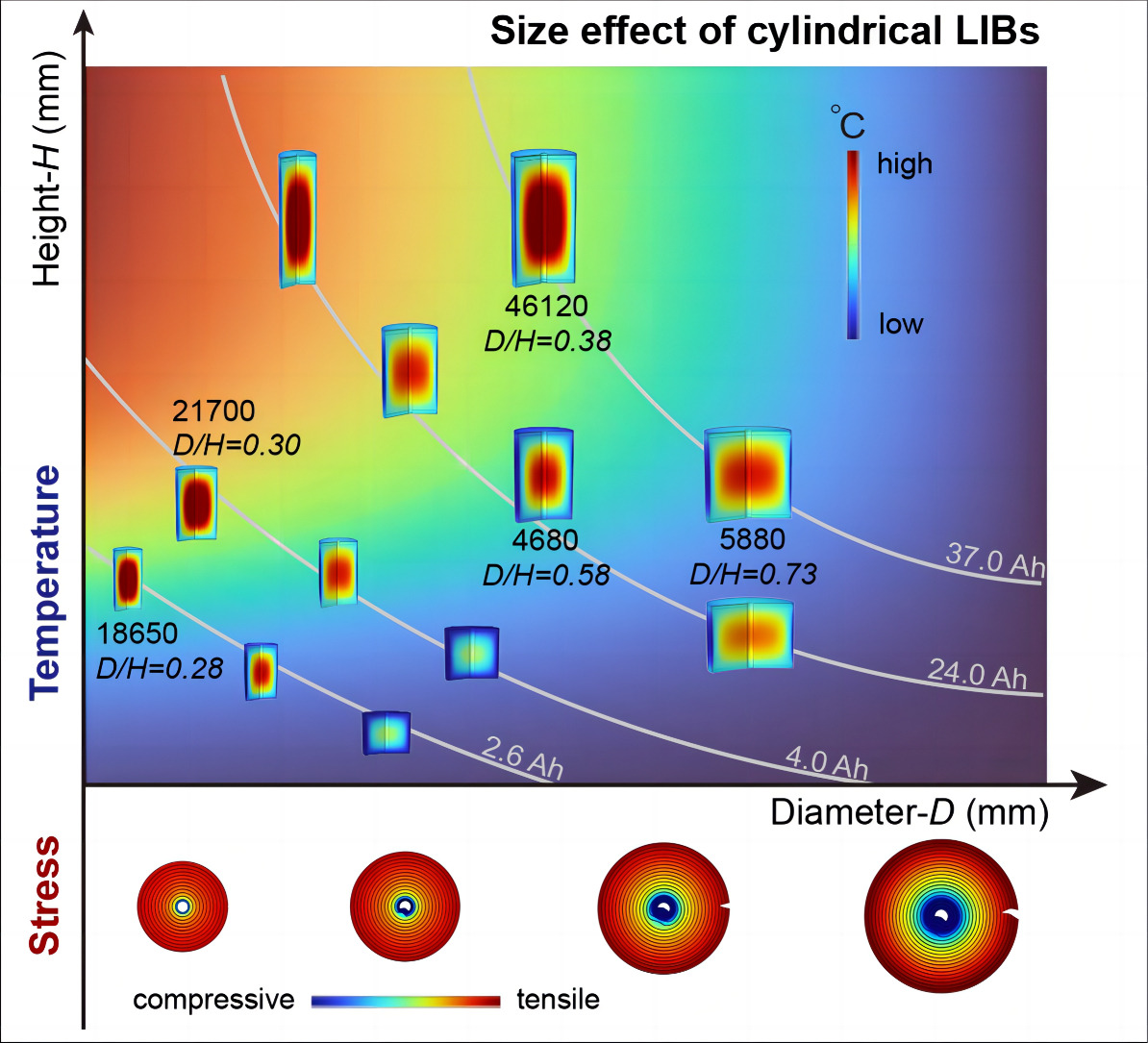ارتفاع درجة حرارة البطارية مشكلة خطيرة قد تحدث أثناء استخدامها، خاصةً عند ارتفاع الطاقة أو الاستخدام لفترات طويلة. لا يقتصر تأثير ارتفاع درجة الحرارة على تدهور أداء البطارية فحسب، بل قد يُشكل أيضًا مخاطر على السلامة، مثل الحريق أو الانفجار. لذلك، يُعد فهم أسباب ارتفاع درجة حرارة البطارية وأعراضه وطرق الوقاية منه أمرًا بالغ الأهمية.إطالة عمر البطاريةوتحسين السلامة.
ما هو ارتفاع درجة حرارة البطارية؟
ارتفاع درجة حرارة البطارية هو تجاوز درجة حرارة تشغيلها النطاق الآمن المُصمم لها. لكل بطارية نطاق درجة حرارة تشغيل مثالي، وعندما تتجاوز هذه الدرجة، قد تصبح التفاعلات الكيميائية داخلها غير مستقرة، مما يؤدي إلى تدهور أدائها وحتى مخاطر محتملة.
عواقب ارتفاع درجة حرارة البطارية
قد تشمل عواقب ارتفاع درجة حرارة البطارية ما يلي:
- تدهور الأداء:يؤدي ارتفاع درجة الحرارة إلى تسريع شيخوخة البطارية، مما يقلل من قدرتها الفعالة ويقصر وقت تشغيل البطارية.
- الهروب الحراري (TR):يمكن أن تؤدي درجات الحرارة المرتفعة إلى حدوث هروب حراري في البطارية، مما يؤدي إلى ارتفاع سريع في درجة الحرارة، وتورم، وحتى الحرائق أو الانفجارات.
- تلف البطارية:قد يؤدي ارتفاع درجة الحرارة لفترة طويلة إلى إتلاف التركيب الكيميائي الداخلي للبطارية، مما يتسبب في حدوث تسرب أوتشوه البطارية.
أسباب ارتفاع درجة حرارة البطارية
يمكن أن تختلف أسباب ارتفاع درجة حرارة البطارية، بما في ذلك:
- الشحن السريع أو الشحن الزائد:يُولّد الشحن السريع تيارات عالية داخل البطارية، مما يؤدي إلى ارتفاع درجة حرارتها. إذا تجاوز تيار الشحن سعة البطارية، ترتفع درجة حرارتها بسرعة.
- بطارية رديئة الجودة أو متدهورة:تتميز البطاريات القديمة أو ذات الجودة الرديئة بزيادة المقاومة الداخلية، مما يؤدي إلى تراكم الحرارة وارتفاع درجة الحرارة.
- درجة حرارة خارجية عالية:في البيئات الحارة، تقل قدرة البطارية على تبديد الحرارة، مما يزيد من احتمالية ارتفاع درجة حرارتها.
- الاستخدام غير السليم أو التفريغ المفرط:يمكن أن ترتفع درجة حرارة البطاريات عند تفريغها بشكل مفرط، وخاصة تحت الأحمال العالية المستمرة.
- عطل في نظام إدارة البطارية (BMS):قد يؤدي الفشل في نظام إدارة البطارية إلى منع المراقبة الصحيحة لدرجة الحرارة والتيار، مما يؤدي إلى ارتفاع درجة الحرارة.
أعراض ارتفاع درجة حرارة البطارية
تشمل الأعراض الشائعة لارتفاع درجة حرارة البطارية ما يلي:
تشوه أو تورم:
يؤدي ارتفاع درجة الحرارة إلى زيادة الضغط الداخلي، مما قد يتسبب في انتفاخ غلاف البطارية أو تشوهه.
رائحة أو دخان:
قد تنبعث من البطاريات الساخنة للغاية روائح أو دخان، مما يشير إلى تفاعلات داخلية مفرطة.
درجة حرارة مرتفعة بشكل غير طبيعي:
ستكون درجة حرارة سطح البطارية أعلى بكثير من درجة حرارة تشغيلها العادية.
انخفاض كفاءة الشحن أو التفريغ:
يمكن أن يؤدي ارتفاع درجة الحرارة إلى تقليل أداء البطارية، مما يؤدي إلى سرعات شحن أبطأ وانخفاض سعة التفريغ.
كيفية منع ارتفاع درجة حرارة البطارية
- استخدم الشاحن المناسباستخدم شاحنًا متوافقًا مع البطارية لتجنب الشحن السريع. تأكد من توافق جهد وتيار خرج الشاحن مع مواصفات البطارية.
- تجنب الشحن الزائد:توقف عن الشحن في الوقت المناسب وتجنب شحن البطارية بما يتجاوز الحد الأقصى لجهدها.
- الحفاظ على درجة حرارة التشغيل المناسبة:تأكد من أن البطارية تعمل ضمن نطاق درجة الحرارة المثالية، وتجنب استخدامها في البيئات ذات درجات الحرارة العالية، وخاصة في درجات الحرارة الشديدة.
- استخدم نظام إدارة البطارية (BMS)يساعد نظام إدارة البطارية (BMS) على مراقبة عمليات الشحن والتفريغ، مما يضمن تشغيل البطارية ضمن المعايير الآمنة ومنع ارتفاع درجة الحرارة.
- التحقق من حالة البطارية بانتظام:قم بفحص مظهر البطارية وأدائها بشكل منتظم لتحديد البطاريات القديمة أو التالفة واستبدالها على الفور.
- تأكد من التهوية الجيدة:تأكد من أن الجهاز الذي يحتوي على البطارية يحتوي على مساحة كافية لتبديد الحرارة لمنع ارتفاع درجة الحرارة.
كيفية التعامل مع ارتفاع درجة حرارة البطارية
في حالة ارتفاع درجة حرارة البطارية، يجب اتخاذ الإجراءات التالية:
- افصل الطاقة:إذا ارتفعت درجة حرارة البطارية أثناء الشحن أو الاستخدام، فتوقف فورًا عن استخدامها وافصل مصدر الطاقة.
- تبريد البطارية:ضع البطارية في منطقة مظللة وجيدة التهوية، وتجنب تعرضها لدرجات الحرارة المرتفعة.
- فحص البطارية:تحقق من عدم وجود أي تلف أو انتفاخ أو تسرب. في حال تلف البطارية، تخلص منها بطريقة آمنة.
- تجنب الاتصال:إذا تعرضت البطارية لارتفاع شديد في درجة الحرارة أو تصاعد الدخان، تجنب ملامستها المباشرة، واحفظ البطارية بعيدًا عن المواد القابلة للاشتعال.
ما هي البطاريات الأكثر عرضة لارتفاع درجة الحرارة؟
تختلف حساسية أنواع البطاريات المختلفة لارتفاع درجة الحرارة. عمومًا،
بطاريات NCM وLCO الأسطوانية 18650:
تكون هذه البطاريات أكثر عرضة لارتفاع درجة الحرارة بسبب استخدام كيمياء النيكل والكوبالت والمنجنيز (NCM) وأكسيد الكوبالت الليثيوم (LCO)، وخاصة في ظل إنتاج الطاقة العالي أو في البيئات ذات درجات الحرارة العالية.
بطاريات LFP (فوسفات الحديد الليثيوم):
بطاريات LFPتتمتع باستقرار حراري أفضل، واحتمالية ارتفاع درجة الحرارة أقل من بطاريات NCM وLCO.
قد تكون البطاريات المنشورية كبيرة الحجم (على سبيل المثال، تلك المستخدمة في مجموعات بطاريات المركبات الكهربائية) أيضًا أكثر عرضة لارتفاع درجة الحرارة، وخاصةً بدون أنظمة تبريد مناسبة.
لماذا تسخن البطاريات غير المستخدمة؟
حتى في حالة عدم الاستخدام، قد تحدث تفاعلات كيميائية داخلية داخل البطارية، مما قد يؤدي إلى تراكم الحرارة. وتحديدًا، عند تخزين البطاريات لفترات طويلة، دون شحنها أو تفريغها بالكامل، أو تخزينها في بيئات حارة، قد تتسبب المقاومة الداخلية في ارتفاع درجة حرارتها.
هل يمكن أن يؤدي ارتفاع درجة حرارة البطارية إلى الانفلات الحراري (TR)؟
نعم، إذا لم يُسيطر على ارتفاع درجة الحرارة بسرعة، فقد يؤدي ذلك إلى هروب حراري (TR). وهي عملية بالغة الخطورة حيث تكثف التفاعلات الكيميائية الداخلية، مما يؤدي إلى ارتفاع سريع في درجة الحرارة، مما قد يؤدي إلى نشوب حريق أو انفجار.
هل تؤثر البطاريات ذات الأحجام المختلفة على تبديد الحرارة؟
يؤثر الحجم على انتقال الحرارة. على سبيل المثال، عند استخدام فرن أو ميكروويف لتسخين كميات مختلفة من الطعام لنفس المدة، تكون درجة حرارة مركز الطعام الأكبر أقل. وبالمثل، تنتقل الحرارة الناتجة عن التفاعل الكيميائي الداخلي للبطارية من الداخل إلى الخارج، ويختلف أداء البطاريات ذات الأحجام المختلفة. في دراسة جين ليودراسة العلاقة بين حجم البطارية الأسطوانية والأداء الحراريوقد تبين أن الخلايا ذات القطر الأكبر إلى الارتفاع (D/H) أظهرت درجات حرارة أقل وتدرجات حرارية أقل.
خاتمة
ارتفاع درجة حرارة البطارية مشكلة يجب أخذها على محمل الجد، خاصةً في الأجهزة عالية الطاقة والمركبات الكهربائية. إن فهم أسباب وأعراض ارتفاع درجة حرارة البطارية واتخاذ التدابير الوقائية المناسبة يُطيل عمرها ويُحسّن سلامتها. الشحن والتخزين المناسبان وبيئة الاستخدام المناسبة والفحص والصيانة الدورية هي عوامل أساسية لتجنب ارتفاع درجة حرارة البطارية.
وقت النشر: ١٢ ديسمبر ٢٠٢٤

